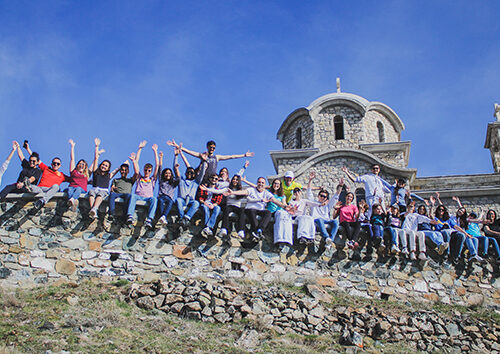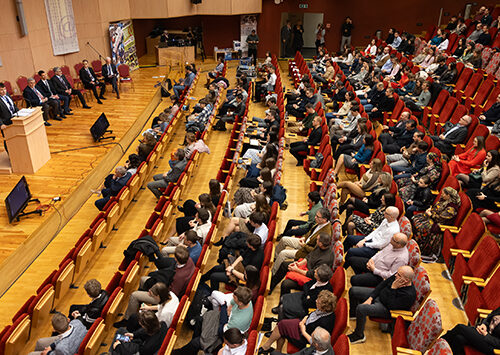22 January 2021 | St Albans, UK [Paul Lockham]
This week’s innovative Trans-European Division (TED) “Devotional Webinars” focus on aspects of Wellbeing. Around 90 attendees, not only staff from the TED office but also the field leaders and directors from across the Division as well as some counterparts from the Inter-European Division, joined each morning on zoom.
HOPE The week started with a presentation on Hope by Patrick Johnson who is the TED Ministerial Association Secretary and Discipleship Director and also carries responsibility for Prayer Ministries, Sabbath School, and Chaplaincy Ministries.
The week started with a presentation on Hope by Patrick Johnson who is the TED Ministerial Association Secretary and Discipleship Director and also carries responsibility for Prayer Ministries, Sabbath School, and Chaplaincy Ministries.
Johnson commenced the webinar referring to the number of disciplines that reference the idea of hope. Building on the understanding that hope is about the future, Johnson referred to the ways that people’s behaviour is influenced by what they hope and expect of the future. Comparing hope and optimism, Johnson went on to look at how hope might be measured, firstly, by using the tool of psychologist Charles R Snyder and then that of Kaye Herth. Referencing the number of times the word hope is used in the Bible, Johnson expanded on Ezekiel’s vision of dry bones as an example of how God will act to bring hope and life. He concluded with a summary of how hope is kept alive in the life of the Christian.
DEALING WITH GRIEF AND LOSS The second webinar in the series was presented by Gábor Mihalec, who is a Family therapist and works part-time as a Family Ministries director at the Hungarian Union.
The second webinar in the series was presented by Gábor Mihalec, who is a Family therapist and works part-time as a Family Ministries director at the Hungarian Union.
Mihalec opened with the statement that grief is felt as a result of a forceful detachment from someone a person is close to. He shared that worldwide, statistically, two people die for every heartbeat. The fact that attachment is a human necessity for a person to flourish has been studied extensively in children but, Mihalec points out, that attachment is needed from the cradle to the grave. Turning to the Bible, Mihalec, developed the theme that God has progressively sought to show Himself and His desire to be in relationship with all humanity.
He concluded with the assertion that for the grieving and lonely, the good news as revealed by Jesus is that God is our ultimate attachment figure.
CONFLICT RESOLUTION Starting with Jesus’ statement “Blessed are the peacemakers”, Karen Holford, TED Family Ministries director and a Family counsellor, developed the idea that unresolved conflict leads to broken relationships. In the church setting these broken relationships almost inevitably result in people leaving the church community. While conflict is normal in our sinful world, being a peacemaker can help to reduce the impact and destructive consequences of that conflict. Holford went on to develop the theme of peace-making being as much about pathways of prevention as about resolution. She shared practical steps and choices, with Biblical examples, on pathways towards building more accepting and cohesive relationships as peacemakers and thus limiting the negative effects of conflict when it does arise.
Starting with Jesus’ statement “Blessed are the peacemakers”, Karen Holford, TED Family Ministries director and a Family counsellor, developed the idea that unresolved conflict leads to broken relationships. In the church setting these broken relationships almost inevitably result in people leaving the church community. While conflict is normal in our sinful world, being a peacemaker can help to reduce the impact and destructive consequences of that conflict. Holford went on to develop the theme of peace-making being as much about pathways of prevention as about resolution. She shared practical steps and choices, with Biblical examples, on pathways towards building more accepting and cohesive relationships as peacemakers and thus limiting the negative effects of conflict when it does arise.
Holford concluded sharing some resources that can help in being more effective peacemakers.
FORGIVENESS AND RESTORATION The final webinar in this series was presented by Daniel Duda who is a Field Secretary for the Division and is also responsible for the Education Department and Adventist Mission.
The final webinar in this series was presented by Daniel Duda who is a Field Secretary for the Division and is also responsible for the Education Department and Adventist Mission.
Duda’s opening statement was “Doing Forgiveness well is the key!” and he went on to look at, how in a broken world, we are going to be hurt by others. Referring to Genesis 4:23-24 Duda summarised the “law of Lamech” as the natural sinful response to hurt, which is to hurt back. Looking at the two aspects required to do forgiveness well, Duda examined who God is, and then, how forgiveness is done. Using Biblical examples, Duda outlined what forgiveness is not in order to understand what forgiveness is, before looking at how forgiveness and restoration being two different things impact the one forgiving.
Concluding with the three Rs of forgiveness Duda reminded us that there is no quick fix, it takes time for a grain of corn to grow.
Each of the webinars has been recorded and is available to view on the TED website and YouTube channel.
tedNEWS Staff: Victor Hulbert, editor; Deana Stojković, associate editor
119 St Peter’s Street, St Albans, Herts, AL1 3EY, England
E-mail: [email protected]
Website: www.ted.adventist.org
tedNEWS is an information bulletin issued by the communication department of the Seventh-day Adventist Church in the Trans-European Division. Readers are free to republish or share this article with appropriate credit including an active hyperlink to the original article.



